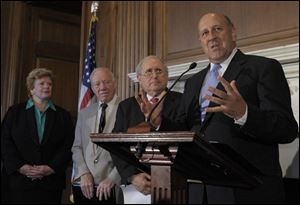
Great Lakes compact flies past House committee, goes to floor
7/31/2008
Wisconsin Gov. Jim Doyle, right, talks on Capitol Hill. Other lawmakers are Sen. Debbie Stabenow of Michigan, left, Rep. James Oberstar of Minnesota, and Sen. Carl Levin of Michigan.
WASHINGTON - A House committee approved a compact yesterday to prevent the diversion of water from the Great Lakes, building momentum to protect one of the world's largest sources of fresh water.
The House Judiciary Committee voted to ratify the Great Lakes agreement, sending it to the House floor. Lawmakers said Congress should act quickly so communities in the region could benefit from the protections.
"The compact will ensure that our Great Lakes will remain stable and vibrant for generations to come," said Rep. John Conyers (D., Mich.), the committee's chairman.
In the Senate, members of the Judiciary Committee noted that the compact was under consideration as Lake Superior's water levels had reached record lows and Lake Michigan's levels had declined. They said approving the compact would target potential water withdrawals that could exacerbate the problem.
"Despite the vastness of the Great Lakes, they are not an unlimited, easily replenished resource," said Sen. Russ Feingold, (D., Wis.).
House and Senate members said they were hopeful that Congress could act on the interstate compact before the end of the year.
Eight Great Lakes states negotiated the agreement that bars countries or remote states from tapping into the lakes from their natural drainage basin with rare exceptions. It also requires the states to regulate their own large-scale water uses and promote conservation.
State leaders in the region developed the plan amid concerns that the worldwide freshwater shortage would lead thirsty regions to try to access the lakes.
Cameron Davis, president and chief executive of the Alliance for the Great Lakes, noted that the United Nations has estimated that by 2025, two-thirds of the world's population would lack ready access to clean, fresh water.
"Without this compact, the Great Lakes are left vulnerable to interests that want to deplete the lakes," said Sen. George Voinovich (R., Ohio).
Governors in the region negotiated the compact for more than four years before reaching an agreement in December, 2005.
Michigan was the last of the eight states to approve the pact earlier this month.
President Bush has urged Congress to approve the compact, and both major presidential candidates, Democrat Barack Obama and Republican John McCain, have said they support it.
Sen. Carl Levin (D., Mich.), who is working with Mr. Voinovich to win passage, said he was hopeful that the agreement would steer clear of a logjam in the Senate that has delayed consideration of other proposals.